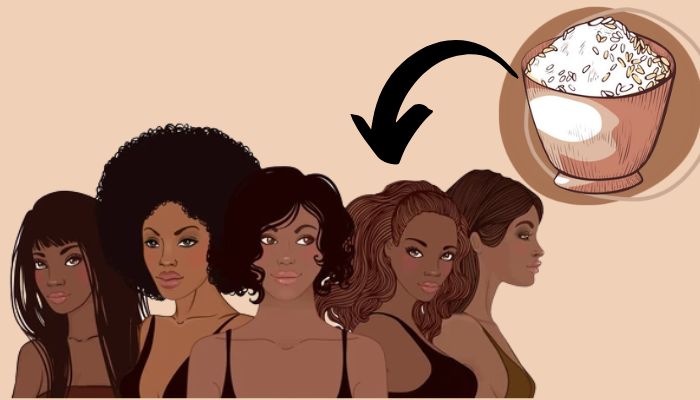According to studies, inositol, an ingredient in rice water, penetrates damaged hair and aids its recovery from the inside out2. Although there is limited scientific evidence to support the effects of rice water on hair, the anecdotal evidence cannot be ignored.
In this article, I will walk you through all you need to know about rice water, its benefits, and how to DIY it.
Also Read: Black People Statistics You Probably Didn’t Know About!
What is rice water?
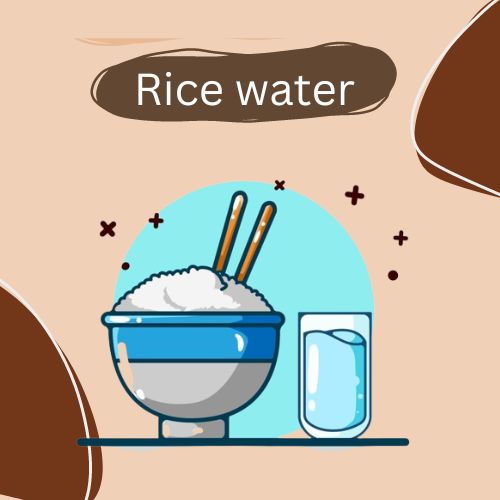
Rice water is the leftover milky or starchy water from washing, soaking, or boiling rice.
Rice water can be made in a variety of ways. Whether you boil, soak, or ferment the rice, the end result is the same: the rice water absorbs the nutrients in the rice.
Rice water is primarily composed of rice starch. Rice has a fairly high starch content, ranging from 70% to 80%. Those starches are released into the water when it is heated, boiled, or even washed.
The water that remains is the rice water.
Try out these rice water spray for your hair
| Image | Product | Features | Price |
|---|---|---|---|
 |
| Check Price | |
 |
| Check Price | |
 |
| Check Price |
Why is rice water used for hair?
The use of rice water on hair dates back to the 8th and 12th centuries CE in Japan, during the Heian Period. There, the women use Yu-Su-Ru; the water leftover from rinsing and cooking rice, to wash their hair. This results in beautiful, shiny, long hair.
To this day, Yao women in Huangluo, China use rice water to grow incredibly long hair and prevent greying. They are often referred to as “real-life Rapunzels,” since their hair is so long.
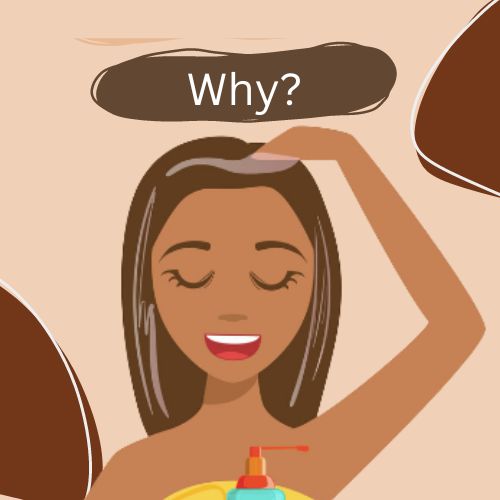
Very likely, women in many Asian cultures continued to use rice water down to the present day.
While it is something that occurred centuries ago, it is a tradition that has since been passed on to different generations.
In exploring the benefits of nature, our forefathers were often more resourceful than we are. They attempted to use all parts of the plants they farmed, just as they used all parts of the animals they hunted or raised.
Additionally, they didn’t have running water at home as we do today. Therefore, water, which often had to be gathered and carried from wells or other sources, was not wasted.
Out of necessity, leftover rice water was probably used for bathing or washing, which is how the benefits of rice were discovered.
Women in the west have only recently discovered this ancient beauty secret, lending credence to the theory that the best remedies are found in nature.
How to make rice water for hair
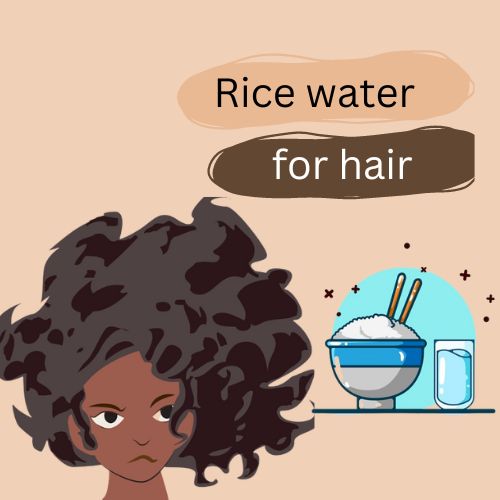
As stated earlier, there are various ways to make rice water. The common methods are discussed below.
But first, you need to gather all the equipment you need. And don’t forget your rice!
You will need:
- Saucepan.
- Bowl
- Pot.
- Strainer.
- Measuring Cup.
- Spray Bottle.
- Water.
- And don’t forget your rice!
Some recipes recommend rinsing the rice briefly in a fine-mesh sieve before preparing the rice water (so you would let this water wash down the drain).
While you will lose some starch, it will also wash away any impurities, which is a good thing.
However, it isn’t necessary. After rinsing, there are three main methods that you can use. The first is soaking, which is the simplest.
Soaking Method
- Put uncooked rice in a bowl and add about four times the amount of warm water. To be sure, use the ratio of ½: 2 or half a cup of rice to two cups of water.
- Let it sit for about 30 minutes, or until the water becomes cloudy and opaque.
- Strain the contents of the bowl through a sieve, capturing the water in another container.
- You will have milky water.
- Pour the contents into a spray bottle.
- The rice water is ready to use.
Boiling Method
With the boiling method, the rice absorbs some of the water while some evaporate. Hence, it’s okay to add half to one cup of water to the rice.
- Let’s use ½: 3 or half a cup of rice to three cups of water.
- Add a half-cup of uncooked rice and three cups of water to a saucepan or pot.
- Bring it to a boil over medium-high heat.
- Reduce the heat but allow the rice to boil for approximately 15 minutes.
- Keep an eye on it to make sure that the water isn’t evaporating too quickly.
- If it is, bring it to a low boil.
- Take the rice off the heat.
- Strain the rice and reserve the water to cool.
- Pour the contents into your spray bottle.
- Eat the rice with your favourite sauce.
Fermentation Method
- Rinse and strain ½ cup of rice to remove any dirt or impurities that you don’t want to apply to your hair.
- Mix the strained rice in a medium-sized bowl with two cups of water. You should mix until the water becomes pretty cloudy.
- Strain the rice.
- Store the rice for later, or cook it.
- Put the rice water in a plastic container and cover it. Let the rice water sit at room temperature for 12 to 24 hours. This allows it to ferment and all of the yummy vitamins and minerals to come out. Don’t let it sit for over 24 hours.
- Fill a small container, like a travel-sized shampoo bottle or a small jar, with rice water for application.
- Keep the rest in your fridge.
How to use rice water for hair growth
Using the recipe or guide above, you can make your own rice water shampoo or conditioner. This is an excellent choice for women with dry scalps because it dilutes the rice water and avoids direct application. Keep in mind that rice water is perishable, so only create a small amount at a time.
After shampooing, spritz rice water on your hair and scalp. After shampooing and conditioning your hair, generously spritz rice water onto the hair and scalp. If you want to increase absorption, massage it in. To keep your hair from drying out, wear a shower cap. Allow it to sit on your hair for 20 to 30 minutes before rinsing thoroughly.
You can use it in the shower as a rinse. You can also shampoo your hair and then rinse it with rice water. This is best for oily hair or if you wash your hair almost every day. Let it stay in your hair for a few minutes, rinse thoroughly with regular water, and use a conditioner once the rice water is rinsed out if needed.
The benefits of using rice water on hair
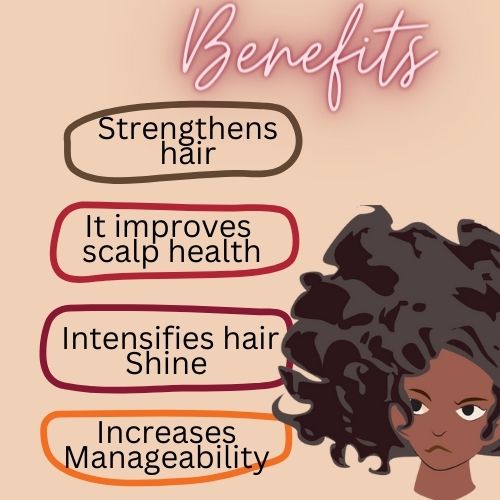
In 2010, the International Journal of Cosmetic Science published an article about the benefits of using rice water in human hair. They concluded that using rice water had two main benefits: increasing the elasticity of the hair and reducing surface friction.
Rice itself is full of essential vitamins and minerals such as Vitamin B and C, which are then transferred to the water when rice water is made. It also contains amino acids and antioxidants, which can help detox your hair.
The benefits based on anecdotal evidence include:
1. Strengthens hair
The starch in rice water may help to strengthen hair. Rice water contains high starch levels, which coats the hair shaft to add strength. Rice water also coats the hair strands, similar to protein, so it does have the ability to strengthen the hair shaft and thicken the hair.
2. It improves scalp health.
Healthy hair grows from a healthy scalp. In treating the scalp with rice water, it is possible to infuse scalp skin with the vitamins, amino acids, and other trace minerals found inside.
3. Intensifies hair Shine
One of the leading causes of dull hair is split ends. Rice water may improve the appearance of hair, as it adds hydration and minimizes the appearance of split ends.
4. Increases Manageability
Using rice water may potentially increase the manageability of your hair. Some of the benefits people claim to experience when using rice water are improved elasticity, an increased shine in the hair, stronger hair, and softer hair that is easier to detangle. However, do note that these results have not been confirmed by scientific research.
5. It potentially aids in hair growth.
Rice water’s ability to influence hair growth is related to its effects on the scalp. Rice water is rich in antioxidants. The antioxidants nourish the hair follicles and repair damaged cells. This promotes healthy hair by creating a supportive environment for hair growth.
Although there are benefits to using rice water, there is no conclusive scientific evidence that it influences hair growth.
Are there any side effects of using rice water on hair?
Yes, the most common downside of using rice water on hair is dryness.
Rice water may cause flaky buildup on the scalp, protein overload on the hair cuticle, dryness, and breakage. Further, Rice water has a heavy starch component that can lead to brittleness and breakage over time.
Moreover, if you have a dry scalp, use caution as well. A 2002 study1 found that starch in rice water helped heal damaged skin in people with dermatitis. And although relief might be experienced from the use of rice water in one dermatitis case study, it could exacerbate the condition in another.
How Often Should I Use Rice Water on my Hair?
This may vary from person to person. You should experiment with different methods of preparing and applying rice water to see what works for you.
For most hair types, using rice water twice a week should be sufficient. Once a week will probably have a positive effect on someone with dry or curly hair. To achieve results, you may need to use the treatment three times per week if your hair is especially oily.
Rice water should only be used on clean hair, so don’t use it more often than when you shampoo your hair.
When you wash your hair frequently, some of the minerals from the rice water will be washed out faster, so you may need to apply the treatment more frequently if you wash your hair almost every day.
Frequently Asked Questions (FAQs)
What are the side effects of rice water on hair?
The top side effects of rice water on hair are that it can make your hair frizzy and brittle, the protein coating stacked on your hair makes it harder for moisture and nutrients to pass through it, and it causes a dry scalp due to the overproduction of yeast in your scalp.
How long should you leave rice water on your hair?
Wash the hair with shampoo, rinse thoroughly with water from the tap, pour rice water onto their hair, massage the rice water into the hair and scalp, leave on for up to 20 minutes, and rinse the hair thoroughly using warm water from the tap.
Can rice water damage your hair?
As nutrient-filled as rice water is, it can also be quite damaging to your hair due to the amount of protein that the water absorbs. Protein overload is when there is too much protein and not enough moisture, which can cause hair to look and feel very dry and brittle.
Does rice water thicken hair?
Rice water contains high starch levels, which coats the hair shaft to add strength. Rice water coats the hair strands, similar to protein, so it does have the ability to strengthen the hair shaft and thicken the hair.
Do you put rice water on wet or dry hair?
Make sure you wet your hair completely with the rice water. Then rinse your hair with cold water. After washing your hair, do not use the hair dryer and let it dry naturally instead. As a final rinse, pour the rice water diluted with a little tap water on your hair.
Can I shampoo my hair after rice water?
No, you cannot wash your hair using shampoo after using rice water. You should just rinse with cold water.
Is it true that rice water grows hair?
The amino acids in rice water not only promote hair growth but also increase hair volume and make the hair smooth and shiny.
Your turn
Even though rice water does not have scientific evidence backing it, when used correctly, it can be an absolute miracle worker for dry, brittle, and unmanageable hair.
Because of all its benefits, rice water is also a great staple to add to your natural hair regimen. It provides overall protection for our strands by strengthening roots, adding lustre and shine, promoting hair growth, and preventing grey hairs.
Also Read Related Articles:
- Why do Black Girls Wear Wig?
- Two Goddess Braids With Curls
- Why do Black People Have Big Lips?
- Wella T14 vs T18: What’s the Difference?
- Knotless Braids vs Box Braids: The Pros and Cons!
- Regular Box Braids: Everything you Need to Know!
- Goddess Braids with Curls: Everything you Need to Know!
- Can Black People Have Red Hair? Facts And Misconceptions!
- Goddess Lemonade Braids with Curls: What You Wish You Knew!
